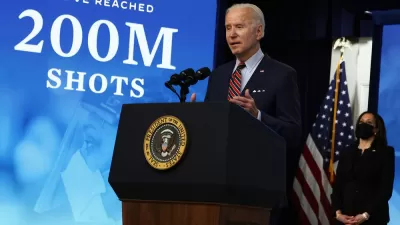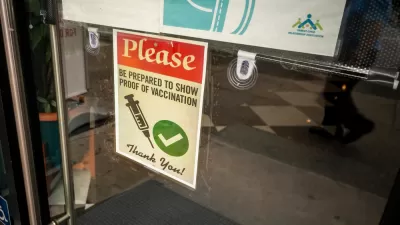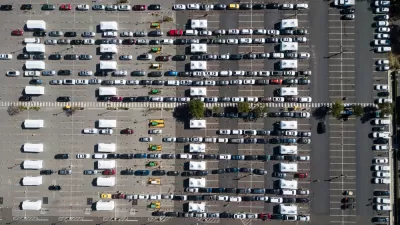Americans who want to know if they are infected with the coronavirus are waiting hours to get tested and not finding rapid tests for at-home testing. Health experts had presented a plan to the administration in October to avoid this crisis.

The scarcity of rapid tests for consumers needing to know their COVID status before traveling and gathering with other households during the holidays was both foreseeable and preventable.
Investigative reporter Katherine Eban obtained a ten-page plan prepared by testing experts that was offered to the Biden administration on Oct. 22 to "[p]ut rapid at-home COVID-19 testing into the hands of average citizens, allowing them to screen themselves in real time and thereby help reduce transmission," the focus of her deep dive published Thursday (Dec. 23) in Vanity Fair.
The plan called for an estimated 732 million tests per month, a number that would require a major ramp-up of manufacturing capacity. It also recommended, right on the first page, a nationwide “Testing Surge to Prevent Holiday COVID Surge.”
The plan, in effect, was a blueprint for how to avoid what is happening at this very moment—endless lines of desperate Americans clamoring for tests in order to safeguard holiday gatherings, just as COVID-19 is exploding again.
A day earlier on Wednesday, President Biden sat down in the White House for a rare interview with ABC News anchor David Muir who asked, "If you go to the pharmacy, we hear this over and over again, empty shelves, no test kits. Is that a failure?"
While Biden wouldn't state it was a failure, he admitted, "I wish I had thought about ordering" 500 million at-home tests "two months ago." He was referring to a plan he announced in a speech from the White House a day earlier "to distribute 500 million free at-home rapid tests to Americans next month, dispatch military members to overburdened hospitals and continue the push to vaccinate and boost all Americans," reported ABC News.
Plan rejected
"But the proposal shared at the meeting in October, disclosed here for the first time, included a 'Bold Plan for Impact' and a provision for 'Every American Household to Receive Free Rapid Tests for the Holidays/New Year,'" adds Eban.
Three days after the meeting, on October 25, the COVID-19 testing experts—who hailed from the Harvard T.H. Chan School of Public Health, the Rockefeller Foundation, the COVID Collaborative, and several other organizations—received a back channel communication from a White House official.
Their big, bold idea for free home tests for all Americans to avoid a holiday surge, they were told, was dead. That day, the administration instead announced an initiative to move rapid home tests more swiftly through the Food and Drug Administration (FDA)'s regulatory approval process.
Testing takes a back seat to vaccinations
"With testing supply and promotion having taken a back seat amid the government’s vaccine push, Preeti Malani, a professor and chief health officer at the University of Michigan, said testing remains 'not anywhere near where it needs to be,'” reported The New York Times on Thursday.
"It’s undeniable that [the administration] took a vaccine-only approach,” said Dr. Michael Mina, a vocal advocate for rapid testing who attended the October White House meeting," wrote Eban.
Mina, "who until recently worked as an assistant professor of epidemiology and immunology and infectious diseases and is now chief science officer at a Miami-based diagnostic company, eMed," appeared on CNN Tonight on Thursday and filled in some of the details of the White House meeting with host Michael Smerconish.
Two and a half weeks before the White House meeting on testing, public health expert Leana Wen wrote that the availability of rapid testing was "the single biggest missing component" in the administration's Path Out of the Pandemic. Wen noted many successful rapid testing programs abroad as examples for the U.S. to follow.
Regulatory hurdles
While the Biden administration chose to advance vaccines according to many experts at the expense of testing and other mitigation measures, home testing also faces considerable regulatory challenges, a major issue that Eban explains in her piece.
So far, the FDA has authorized only 13 rapid antigen tests. It has also authorized three at-home molecular tests, which have a sensitivity closer to that of a laboratory PCR test.
Europe, on the other hand, has taken a different approach.
With roughly 200 different home tests approved in Europe, the price is as low as $1.50 a test, said said Peer Schatz, managing director of PS Capital Management, a venture fund for clinical diagnostics. “You go to offices and meetings, you see these tests lying around. It’s a free giveaway, like masks.”
The October meeting was not the first time that the Biden administration rejected to pursue a dramatic ramp-up of home testing. Mina and Dr. Steven Phillips of the COVID Collaborative approached the Biden administration in January with "a 23-page document outlining a national rapid-testing strategy."
It made a case for rapid testing as the most powerful tool to reduce transmission and case counts quickly. But the Biden administration, said Phillips, lacked “the imagination to have an Operation Warp Speed-level program for testing.”
Current plan
"Dr. Eric Topol, director and founder of the Scripps Research Translational Institute in La Jolla, California, called the plan to make 500 million free rapid tests available sometime next year 'totally inadequate,' writing, 'We need several billion of these, and have needed them for over a year to help prevent spread, as validated and relied upon in many countries throughout the world,'” adds Eban.
Still, Mina sees the administration’s long-awaited U-turn as a hopeful sign. “Omicron pushed them over the edge,” he said. “We have to admit at every level of government that vaccines are not the end of this.”
Additional reading in The Washington Post on the Biden administration's handling of COVID testing:
- Politics: Inside the administration’s failure to avert a covid testing shortfall, December 23, 2021: "This late-December disarray — crowded testing sites, empty drugstore shelves — is raising fresh questions about how Biden and his team have executed on his pledge to defeat the pandemic, writes Annie Linskey.
- Opinion: President Biden is failing on covid-19, December 22, 2021: "We already know vaccines alone will not solve this problem," opines Gregg Gonsalves, an associate professor of epidemiology at the Yale School of Public Health. "The president made a bet in March that vaccination could return the country to some semblance of normalcy, promising a 'summer of freedom'.”
- Health: Rapid coronavirus tests are still hard to find in many places, despite Biden vows, Dec. 9, 2021: "Nearly a year into his administration, the availability of low-cost coronavirus tests that return results in as little as 15 minutes remains an oft-promised but still unrealized capability in large swaths of the country — a far cry from the situation in countries such as Britain and Singapore, where the government purchased the kits last spring and distributed millions of them free or at low cost," report
Yasmeen Abutaleb, Lena H. Sun, Laurie McGinley, Dan Diamond and Tyler Pager.
Related in Planetizen:
- The Major Shortcoming in Biden's COVID Action Plan, October 21, 2021
- Widespread Coronavirus Testing Critical for College Reopenings, But..., September 21, 2020
- U.S. Needs to More Than Triple Testing Before States Can Open, Study Says, April 20, 2020
-
Drive-Through Coronavirus Testing Promises Not Yet Fulfilled, April 2, 2020
Hat tip to Michael Smerconish, CNN Tonight, Dec. 23, 2021
FULL STORY: The Biden Administration Rejected an October Proposal for “Free Rapid Tests for the Holidays”

Planetizen Federal Action Tracker
A weekly monitor of how Trump’s orders and actions are impacting planners and planning in America.

Maui's Vacation Rental Debate Turns Ugly
Verbal attacks, misinformation campaigns and fistfights plague a high-stakes debate to convert thousands of vacation rentals into long-term housing.

San Francisco Suspends Traffic Calming Amidst Record Deaths
Citing “a challenging fiscal landscape,” the city will cease the program on the heels of 42 traffic deaths, including 24 pedestrians.

Amtrak Rolls Out New Orleans to Alabama “Mardi Gras” Train
The new service will operate morning and evening departures between Mobile and New Orleans.

The Subversive Car-Free Guide to Trump's Great American Road Trip
Car-free ways to access Chicagoland’s best tourist attractions.

San Antonio and Austin are Fusing Into one Massive Megaregion
The region spanning the two central Texas cities is growing fast, posing challenges for local infrastructure and water supplies.
Urban Design for Planners 1: Software Tools
This six-course series explores essential urban design concepts using open source software and equips planners with the tools they need to participate fully in the urban design process.
Planning for Universal Design
Learn the tools for implementing Universal Design in planning regulations.
Heyer Gruel & Associates PA
JM Goldson LLC
Custer County Colorado
City of Camden Redevelopment Agency
City of Astoria
Transportation Research & Education Center (TREC) at Portland State University
Jefferson Parish Government
Camden Redevelopment Agency
City of Claremont





























